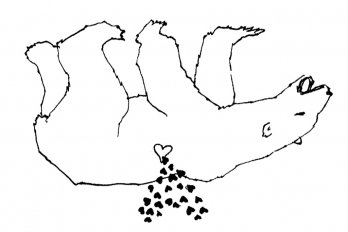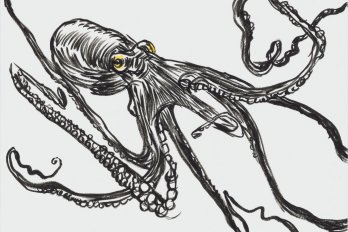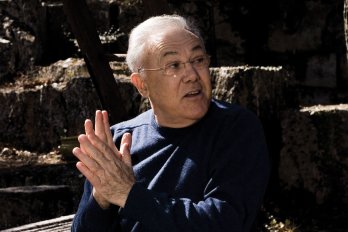
Located at the southern tip of Spain, on the shores of the Mediterranean Sea, the small Andalusian town of Tarifa is a windsurfer’s paradise. Each year thousands of enthusiasts come from near and far to test themselves against the winds gusting off the Atlantic Ocean, enjoy the balmy sunshine, and sample a nightlife that pulsates with a certain European vigour. For the footloose and well-to-do, Tarifa is a playground. But a mere fourteen kilometres across the Strait of Gibraltar, and clearly visible from Tarifa’s sandy beaches, rise the rugged slopes of Morocco’s north shore, where an altogether different reality persists.
The ancient Greeks referred to the rocky outcroppings of the Strait of Gibraltar as the Pillars of Hercules. It is here that Africa ends and Europe begins, that poverty and destitution are linked with, yet divided from, hope and opportunity. As a naval outpost still under British sovereignty—a fact that rankles Spanish national feelings—Gibraltar seems anachronistic, tied, however tangentially, only to Britons seeking summer sun on Spain’s warm shoreline. Following the Moors’ great push across North Africa, they conquered the Iberian Peninsula in the eighth century and controlled a great part of Spain until the fifteenth century. The Islamic conquerors were ultimately defeated, but the syncretic blending of cultures produced a legacy still very much in evidence.
And across the Mediterranean there may be a new convergence under way. Behind the windsurfers of Tarifa and pleasure locations across the north shore of the Mediterranean Sea, power politics and extraordinary business deals between European and North African countries are leading to agreements that could fundamentally reshape the economic power and geopolitical significance of the entire region. It is a great game that could dramatically improve the fortunes of countries across the Maghrib—from Egypt to Morocco—and supply Europe with one of its most pressing needs: a secure energy supply. But, as in all great games, there are numerous hurdles to overcome first.
Today, even in the heightened climate of terrorist threats and the supposed “clash of civilizations,” it is not so much the jihadists—or even shadowy sects of Islam known as Salafists (thought by many to be responsible for recent terrorist attacks in Europe)—who are the primary concern of Spain and the European Union. Rather, it is the thousands of black Africans escaping penury and starvation and descending on the continent’s shores looking for a way—any way—into the European paradise.
In Spain, the Moroccans, numbering roughly 500,000, constitute one of the country’s largest immigrant groups, and their integration into Spanish society has been anything but smooth. However, Moroccans no longer occupy the lowest rank. That position is now held by newly arrived sub-Saharan Africans, most of whom toil at picking tomatoes and peppers in the plastic hothouses of Murcia and Almeria or at other forms of menial and temporary employment. Working without security or benefits and at subsistence wages, these black Africans are deemed necessary for their labour and their labour only. After the picking seasons have ended they move on to low-paid jobs in Spain’s construction boom. But desperate people will do desperate things, and black Africans continue to spill into the Iberian Peninsula. Their methods of arrival continue to create concern.
Following his March 2004 election victory, Spain’s socialist prime minister, José Luis Rodríguez Zapatero, made his first official visit to Morocco. Having defeated José María Aznar and the Popular Party’s attempts to capitalize on the Madrid bombings by promoting—among other polarizing policies—isolationism from North Africa, Zapatero’s spirits ran high and the symbolism of this visit was lost on no one. Just the same, improving relations with Morocco over illegal immigration coming from Morocco’s northern coast and, increasingly, from the disputed territory of Western Sahara is no easy matter. The Spanish have questioned not only Morocco’s management of that territory but also its very sovereignty over it. And such statements by the former colonial power have been met with stiff rebukes. “Neither I nor the people of Morocco will ever accept giving up Morocco’s sovereignty over these provinces [Western Sahara],” said Morocco’s King Mohammed VI during a January 2005 official visit from Spain’s King Juan Carlos.
The Spanish ruler made it clear that a solution had to be found within the framework of the United Nations. The difficulty is that all international resolutions about the issue of the Western Sahara—including UN directives, the Baker Plan (named after former US secretary of state James Baker), and the negotiated settlement now being advocated by Peruvian diplomat Alvaro deSoto—ultimately point to allowing the indigenous population, the Saharawis, to vote on self-determination. The situation is further complicated by Algeria’s open support for the remnants of Frente polisario, a Western Saharan resistance group, something that has long soured its relations with neighbouring Morocco.
From the Spanish perspective, while Rabat, the Moroccan capital, claims to be controlling the outflow of illegal immigrants, Madrid insists otherwise. In 2004, 289 bodies of drowned Africans were picked up in the waters between Morocco and the Spanish territories (from Cadiz to the Canary Islands), and that same year over 7,000 others were intercepted off the island of Fuerteventura alone. Last year, the number of drowned rose to 368.
In September, hundreds of sub-Saharan Africans besieged the controversial Spanish outpost of Ceuta on Morocco’s north shore. Many got through, but five were shot and killed. Then, in October, much the same thing happened at Melilla, this time resulting in six deaths. To prepare for these raids the Africans hid in inhospitable scrublands, fashioned makeshift ladders out of local materials, and, eventually, scaled two rows of chain-link and barbed-wire fences protecting each of the two towns. Many of those who succeeded in their dangerous gamble did so only after being badly bruised from falls or seriously cut by the razor-sharp wire. In scenes both horrendous and pathetic, apprehended Africans were shown on Spanish television, handcuffed in pairs and paraded into deportation buses. Prior to these events, it was reported that the Moroccan police had transported hundreds of escapees deep into the desert and abandoned them there without food or water.
Madrid sent a contingent of troops to help the Civil Guard of Ceuta and Melilla, and talks are under way about building a third fence around each town. But the desire for freedom is such that an underground economy of body-runners and speedboat operators—the visible edge of organized crime based in Morocco, Spain, and all around Gibraltar—has long been ferrying people (and drugs) across the Strait. These mercenaries charge, on average, 1,000 euros per person, cram thirty people into boats designed for eight, and offer no guarantees of safe landing. The Spanish government has responded by arming the coast guard with infrared cameras, radars, thermal sensors, and the manpower required to pick up small crafts approaching the Spanish coast. It is a dangerous nighttime game of high-speed cat and mouse, and encounters between the coast guard and the body-runners usually result in the latter dumping their human cargo—including pregnant women and children—overboard or unloading them on a lonely beach, with some suffering from hypothermia and all exhausted and without resources.
Spanish attempts to halt this illegal traffic have worked only after a fashion. Across these particular waters the intercepts are now fewer, but the body-runners have also adapted, and the preferred new route involves speeding from Western Sahara to the Canary Islands, 100 kilometres off the African coast and through more treacherous ocean waters. Swamped by illegal immigration, island authorities at these autonomous Spanish islands are demanding the same technological barriers as those now in place on Spain’s southern coast. Impressed with the good results there, they want this system put into operation along Morocco’s entire Atlantic coast.
Halfway along the Mediterranean, Libya served for years as the staging ground for a similar traffic in human cargo into Italy. Italians finally demanded that the government of Silvio Berlusconi staunch the flood, but such an action required delicate statecraft as the newly reformed Libyan leader Muammar al-Qaddafi has had his own cards to play. Over the past few years Libya has welcomed a cluster of competing international oil companies to explore and exploit its enormous oil and gas reserves. Already a sizable producer—pumping out over 1.5 million barrels of oil a day—Libya has eclipsed Indonesia’s output and its market share competes favourably with Kuwait. Combined with Algeria, the region now produces more oil than Venezuela, and an energy-starved Europe has clearly taken notice.
Qaddafi opened the door to foreign direct investment and encouraged tourism from Italy and the rest of Europe. As part of a friendship deal, Libya also set up detention camps to stop the flow of immigrants into Italy. “You detain black immigration and we’ll boost your oil output,” Berlusconi was essentially saying, and the message was received. In 2004, Italy promoted lifting the EU arms embargo on Libya and, paralleling Spain’s surveillance umbrella operative around the Strait of Gibraltar, that allowed Libya to acquire patrol boats, helicopters, and night-vision equipment to halt illegal immigration into Sicily.
It’s hard to imagine two more unlikely bedfellows than Qaddafi and Berlusconi, but in this region of the world old enemies are quickly becoming new friends. Following the lifting of the arms embargo, French President Jacques Chirac was quick to pay a visit to Tripoli to bolster relations with Qaddafi. While until recently Spanish investment across the Strait largely involved the relocation of labour-intensive plant operations to the cheap-labour conditions of Morocco, there is now a very different investment climate attracting Spanish money to the entire Maghrib region.
But events have caught up with these budding relationships. After the London bombings and the riots outside of Paris last fall and with disquiet about African and Muslim immigration across member states, in December the EU agreed to establish a Community Border Fund by the end of this year. While the title sounds benign, the goal is to halt illegal immigration and help legitimate newcomers establish themselves. A centrepiece of the fund, initially proposed by Spain’s Zapatero, is the extension of his country’s electronic sur-veillance system to cover the entire Mediterranean coast of Europe. The move has given Zapatero some political mileage within the EU and is intended, partly, to satisfy French demands for program money to assist with assimilation, but the anxiety remains about “barbarians at the gate” or already resident. In Britain, a recent Home Office report estimates that close to 570,000 “illegals” are living there. Like Canada and the United States, Britain is considering biometric identity cards.
At the same time, opponents of “Fortress Europe” insist that the EU has good reason to embrace the entire Mediterranean basin, and the facts on the ground are compelling. Libya’s booming energy sector is impressive, but Algeria may be the sleeping giant. Its proven oil reserves top twelve billion barrels, and forecasts are bullish. And at 160 trillion cubic feet of proven reserves but with estimates ranging upward to 282 trillion, its natural-gas potential is more impressive still. Total investment in Algeria’s oil and gas sector is expected to run between $50 billion and $70 billion (US) over the next ten years. Moreover, business opportunities cover the entire gamut from exploration to refinery development, processing, pipeline construction, and other infrastructure projects. It is the stuff upon which a robust economy can be built, and almost all of the financing is being driven by Europe’s need for a secure energy future.
For decades, lpg carriers took liquefied petroleum gas from Algeria to both Spain and France, but the growing demand for the Maghrib’s natural gas has led to two major pipeline projects. One pipeline already runs from Algeria through Morocco and under the sea at the Strait of Gibraltar. Under a contract with Algeria’s state-owned company Sonatrach, the Spanish group Gas Natural transports nine billion cubic metres of natural gas a year through this pipeline and ships another five billion cubic metres in liquid form. This company recently joined Repsol ypf—a major energy corporation with extensive interests in Latin America, Iran, and Nigeria—in a substantial exploration deal in western Algeria. Beating out leading European competitors like British Petroleum, Eni, total, and Royal Dutch Shell, the Repsol ypf/Gas Natural team has won a concession from Sonatrach to explore, produce, and market natural gas at Gassi Touil.
Spanish companies are also making a strong bid in Libya. Repsol ypf—currently developing an integrated project with Irving Oil in eastern Canada—is already active in Libya, producing some 200,000 barrels a day from the huge El Sharara field. And, through a consortium with French-owned total, Austria’s omv, and Norway’s Saga Petroleum, Repsol ypf is now opening up other fields. The Barcelona-based savings bank La Caixa is reportedly looking to participate in pipeline construction.
The next stage of the rapidly evolving Algerian-Spanish energy relationship is a vast pipeline project launched by Medgaz, a Spanish-French partnership corporation (with ties to Sonatrach and other energy giants) created specifically for this project. The pipeline will bypass Morocco and pipe gas directly from Algeria’s coastal city of Beni Saf to Perdigal Beach in Almeria, on Spain’s southern coast. It is designed to move between eight and sixteen billion cubic metres of gas a year. Technical studies are now complete, and with an offshore length of 200 kilometres this pipeline will lie on the sea floor more than 2,000 metres down at its lowest depth. Apart from securing supply, the advantage of the Medgaz project is that customers will not have to bear the added costs of piping gas through Morocco. In view of its heavy dependence on Algeria’s gas reserves, Spain is trying to keep all options open, and the Medgaz pipeline is now being given high priority by the Spanish government.
While Morocco has clearly articulated its position on sovereignty over Western Sahara, it needs Madrid’s support to improve its trade potential and current agreements with the EU. For any quid pro quo exchange, however, Spain undoubtedly would like to see an end to illegal immigration out of Western Sahara, as well as access to the rich fishing grounds off its shore. Happily for Morocco, Spanish oil and gas interests have obtained exploration rights off its coast, and electrical power potential is also attracting investment. Endesa, a Madrid-based power company, was involved in construction of a major new thermal power plant near Tangiers. With an installed capacity of 380 megawatts, this plant will eventually provide 20 percent of Morocco’s power needs.
Spain has traditionally played a positive role as an intermediary between North Africa and Europe, and after it withdrew its troops from Iraq this reputation was enhanced on both shores. Clearly, while problems remain, enlightened self-interest has caused Spain to reach out to its neighbour. And, indeed, Morocco’s anxieties about being left out of the growing Mediterranean economic boom seem to be in abeyance. On both sides there are even those dreaming the ultimate dream—a railroad tunnel under the Strait of Gibraltar to further economic integration and to physically link the two continents.
As the horse-trading between EU member states and the countries of North Africa’s Mahgrib plays itself out, the United States has found itself comparatively on the sidelines. Recent US moves to draw Morocco more firmly into its orbit include a free-trade agreement between the two countries. Washington’s decision to lift its long-standing ban on US oil-company investment in Libya indicates its interest in North African oil as a reliable trans-Atlantic energy source. But in this race to invest, the Europeans have the upper hand. Across the Maghrib, countries currently undergoing an oil and gas boom are determined to make the most of it. Despite the positive aspects of the new free-trade agreement between Washington and Rabat, the Moroccans and others believe that their real interests lie with an expanding Europe. Oil and gas are the new currency of mare nostrum.
When US Undersecretary for Political Affairs Marc Grossman went to Morocco in the spring of 2004 to explain the Bush administration’s “initiative for a Greater Middle East,” King Mohammed VI made it clear that in the Muslim world one size does not fit all, that observing Palestine’s right to self-determination was critical, and that the war in Iraq was a disaster. As the king later described in an interview with the influential Spanish newspaper El País, “I told him [Grossman] we did not form part of the Greater Middle East and that you could not put the whole Arab world in one basket, that Morocco was part of the Maghrib in North Africa. We share many things with our friends in the Middle East but we are not faced with the same realities. I also told him we had not just been waiting for him to come here to carry out reforms. We had already made many changes without his advice. We maintain excellent relations with the United States but because we are friends we should not avoid speaking out clearly.”
A local saying in Gibraltar is, “As long as the Barbary apes are still roaming wild on the Rock, it will continue to fly the British flag.” Thanks to its relationship with Britain—a relationship Spain refuses to accept—Gibraltar recently became an EU member, which has jeopardized its status as a tax haven for some 8,000 offshore companies. The European Commission has established a “dialogue forum” to investigate the issue but has already demanded that Gibraltar-as-tax-haven be disbanded by 2010. Gibraltar’s outmoded naval base stands as a relic of the past, but still generates criticism and protests, especially over the British practice of docking nuclear submarines at its port. On the other hand, the US naval base at Rota in Spain, 100 kilometres from the Rock, where US bombers destined for Iraq refuelled, stands as a constant reminder of US military hegemony.
In the Europe/North Africa oil and gas gamble, in the attempt to revolutionize the Mediterranean on both sides, it remains to be seen if any benefits will trickle down to Black Africa. As Libya, Algeria, Morocco, and others become further integrated with Europe, the Sahara Desert will become the natural northern border of Africa. Meanwhile, sub-Saharan Africa remains a volcano overflowing with corruption, disease, starvation, and internecine war. For many, the only solution is to reach the shores of Paradise Europe by any available means.





